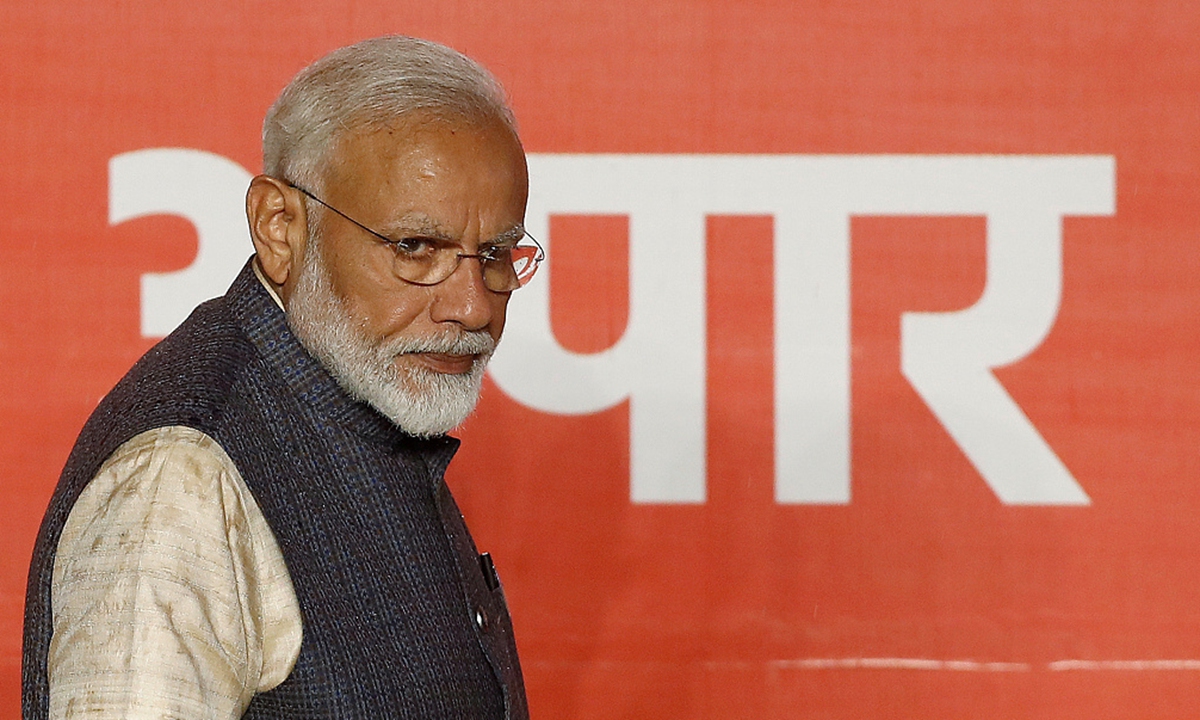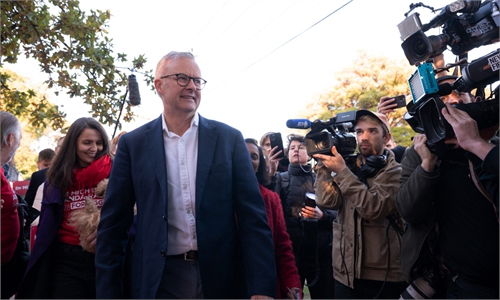India expected to maintain autonomy at upcoming Quad summit, still cautious about IPEF despite being initial signatory: analysts

Modi File photo: VCG
India, a South Asian power that has shown significant differences in attitude toward Russia and other three members of the four-nation coalition Quad, is expected to maintain its autonomy and continues to be cautious about the US-proposed Indo-Pacific Economic Framework (IPEF) for the sake of its own interests despite being an initial signatory, analysts said, as Indian Prime Minister Narendra Modi arrived in Tokyo on Monday to join the upcoming Quad summits on Tuesday.
According to Indian local media reports, Modi left on Sunday and after arriving in Tokyo on Monday morning, he will fulfill a total of 23 engagements in around 40 hours of stay in Japan, which will include meetings with 36 Japanese CEOs, with hundreds of Indian diaspora members, and participation on Tuesday to the second in-person summit of the four-nation strategic security dialogue between the US, Japan, India and Australia, that is commonly referred as the Quad.
Although Quad is a bloc designed to form a united front against China in the so-called Indo-Pacific region, India would also prefer a benign agenda to develop in the region, rather than completely turning adversarial toward China, analysts speculated.
That would put India's attitude over the US-proposed scheme, the IPEF, under the spotlight, and to what extent India would participate in the proposal, matters,analysts said.
Biden formally launched the IPEF on Monday in Tokyo, with 13 countries including India and Japan signing up, but questions about the pact's effectiveness remain.
India was initially reluctant to join the IPEF, as it is keener on having a bilateral trade pact with the US and plurilateral agreements under the Quad, local media The Print reported on Friday, days ahead of the summit.
Unlike traditional free trade agreements (FTA), the IPEF would include different modules covering "fair trade, supply chain resilience, infrastructure and decarbonization, tax and anticorruption." Countries would have to sign up to all of the components within a module, but do not have to participate in all modules, Indian Express reported on Saturday.
Some view the IPEF a means by which the US is trying to regain credibility in the region after former president Donald Trump pulled out of the Trans Pacific Partnership.
India has its concerns about the non-FTA deal, being cautious about the non-tariff-cutting multilateral framework and doubting whether it can really provide substantial benefits to any emerging economy in South Asia, Qian Feng, director of the research department at the National Strategy Institute at Tsinghua University told the Global Times.
Zhao Gancheng, director of the Centre for Asia-Pacific Studies, Shanghai Institute for International Studies, pointed out that the IPEF is a haphazard work in the first place and has never been seriously thought over in the US. The document is mostly an instrument that will allow the US to pursue its goals of attracting more allies to counter China.
Indian media the Print citing sources reported on Friday that India and the US reached an understanding during the Union Finance Minister Nirmala Sitharaman's visit to the US last month. It was agreed then, that although the IPEF will demand "high standards" by way of establishing and maintaining trade facilitation, supply-chain resilience and infrastructure, it will nevertheless be a "strategic move" targeting China.
Liu Zongyi, secretary-general of the Research Center for China-South Asia Cooperation at the Shanghai Institutes for International Studies, wrote in an opinion piece on Monday that India is considered as the key cornerstone for the US Indo-Pacific strategy, it is almost necessary for the US to get India onboard the IPEF.
However, what India really wants is to build a South Asia-Indian Ocean economic zone by obtaining bilateral FTAs with the US and striving for the best possible market access, which cannot be addressed by the current IPEF, he noted.
Liu also warned that if India, with its current economic development, will join the IPEF, it will have to come face to face with the fact they will become a US economic vassal. On the other hand, the joining of India to the IPEF would delay the process for the pact to come into shape.
In terms of the Quad summit on Tuesday, Modi is still reluctant to follow the other Quad members to change its neutral stance on the Ukraine issue, nor will India join the sanction scheme against Russia, analysts said.
India's foreign affairs secretary Vinay Mohan Kwatra said on Saturday the upcoming Quad summit would provide the leaders with an opportunity to take stock of the progress made so far under the Quad framework and give guidance for the future.
India media speculated that the Quad leaders will deliberate on the challenges they face [among which, the ongoing Ukraine crisis is expected to be the main focus of discussion] and opportunities in the Indo-Pacific region, as well as pressing global issues at their summit talks on May 24 in Tokyo.
Qian said India has been taking a stance of 'dialogue over criticism' on Russia, and that, for the sake of India's own interests, is unlikely to change despite pressure from the other Quad leaders.
Although India has been criticized by the US-led West over its neutral stance on Russia, India has in fact gained more diplomatic benefits exactly due to its autonomy, which is why the country insists on not following the other three in condemning and punishing Russia, or take any concrete measures to further challenge China, Qian said.
Due to India's insistence, criticism against Russia is unlikely to be mentioned in the four-nation joint statement that will be inked at the end of the summit, this is to avoid showcasing inconsistencies in the bloc. Alternatively India may exclude itself from the section about Russia, Qian noted.



